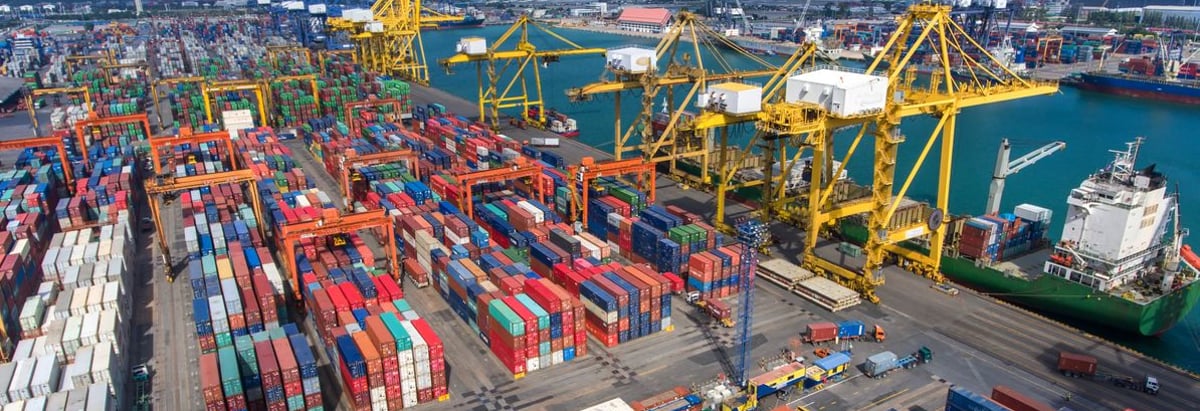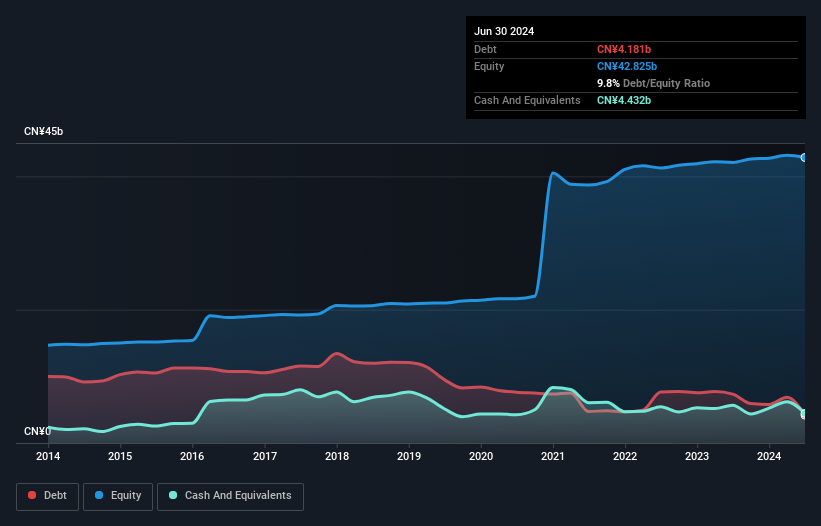
Some say volatility, rather than debt, is the best way to think about risk as an investor, but Warren Buffett famously said that 'Volatility is far from synonymous with risk.' When we think about how risky a company is, we always like to look at its use of debt, since debt overload can lead to ruin. We can see that Liaoning Port Co., Ltd. (HKG:2880) does use debt in its business. But is this debt a concern to shareholders?
When Is Debt Dangerous?
Generally speaking, debt only becomes a real problem when a company can't easily pay it off, either by raising capital or with its own cash flow. In the worst case scenario, a company can go bankrupt if it cannot pay its creditors. While that is not too common, we often do see indebted companies permanently diluting shareholders because lenders force them to raise capital at a distressed price. By replacing dilution, though, debt can be an extremely good tool for businesses that need capital to invest in growth at high rates of return. The first thing to do when considering how much debt a business uses is to look at its cash and debt together.
See our latest analysis for Liaoning Port
What Is Liaoning Port's Net Debt?
The image below, which you can click on for greater detail, shows that Liaoning Port had debt of CN¥4.18b at the end of June 2024, a reduction from CN¥7.33b over a year. However, it does have CN¥4.43b in cash offsetting this, leading to net cash of CN¥250.8m.

A Look At Liaoning Port's Liabilities
Zooming in on the latest balance sheet data, we can see that Liaoning Port had liabilities of CN¥4.63b due within 12 months and liabilities of CN¥7.29b due beyond that. On the other hand, it had cash of CN¥4.43b and CN¥4.63b worth of receivables due within a year. So its liabilities total CN¥2.85b more than the combination of its cash and short-term receivables.
Since publicly traded Liaoning Port shares are worth a total of CN¥31.8b, it seems unlikely that this level of liabilities would be a major threat. But there are sufficient liabilities that we would certainly recommend shareholders continue to monitor the balance sheet, going forward. Despite its noteworthy liabilities, Liaoning Port boasts net cash, so it's fair to say it does not have a heavy debt load!
But the other side of the story is that Liaoning Port saw its EBIT decline by 3.4% over the last year. If earnings continue to decline at that rate the company may have increasing difficulty managing its debt load. There's no doubt that we learn most about debt from the balance sheet. But it is Liaoning Port's earnings that will influence how the balance sheet holds up in the future. So when considering debt, it's definitely worth looking at the earnings trend. Click here for an interactive snapshot.
Finally, while the tax-man may adore accounting profits, lenders only accept cold hard cash. While Liaoning Port has net cash on its balance sheet, it's still worth taking a look at its ability to convert earnings before interest and tax (EBIT) to free cash flow, to help us understand how quickly it is building (or eroding) that cash balance. In the last three years, Liaoning Port's free cash flow amounted to 43% of its EBIT, less than we'd expect. That's not great, when it comes to paying down debt.
Summing Up
We could understand if investors are concerned about Liaoning Port's liabilities, but we can be reassured by the fact it has has net cash of CN¥250.8m. So we don't have any problem with Liaoning Port's use of debt. Over time, share prices tend to follow earnings per share, so if you're interested in Liaoning Port, you may well want to click here to check an interactive graph of its earnings per share history.
If, after all that, you're more interested in a fast growing company with a rock-solid balance sheet, then check out our list of net cash growth stocks without delay.
New: AI Stock Screener & Alerts
Our new AI Stock Screener scans the market every day to uncover opportunities.
• Dividend Powerhouses (3%+ Yield)
• Undervalued Small Caps with Insider Buying
• High growth Tech and AI Companies
Or build your own from over 50 metrics.
Have feedback on this article? Concerned about the content? Get in touch with us directly. Alternatively, email editorial-team (at) simplywallst.com.
This article by Simply Wall St is general in nature. We provide commentary based on historical data and analyst forecasts only using an unbiased methodology and our articles are not intended to be financial advice. It does not constitute a recommendation to buy or sell any stock, and does not take account of your objectives, or your financial situation. We aim to bring you long-term focused analysis driven by fundamental data. Note that our analysis may not factor in the latest price-sensitive company announcements or qualitative material. Simply Wall St has no position in any stocks mentioned.
About SEHK:2880
Excellent balance sheet second-rate dividend payer.
Market Insights
Community Narratives


